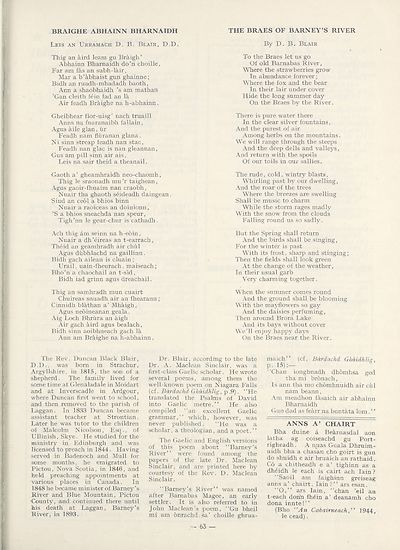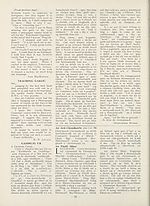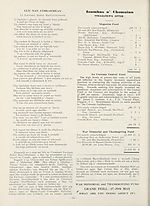An Comunn Gàidhealach Publications > Gaidheal > Volumes 44--45, January 1949--December 1950
(375) Page 63
Download files
Complete book:
Individual page:
Thumbnail gallery: Grid view | List view

BRAIGHE ABHAINN BHARNAIDH
THE BRAES OF BARNEY’S RIVER
Leis an Urramach D. B. Blair, D.D.
Thig an aird leam gu Br&igh’
Abhainn Bharnaidh do’n choille,
Far am fas an subh-lair,
Mar a b’kbhaist gun ghainne;
Bidh an ruadh-mhadadh baoth,
Ann a shaobhaidh ’s am mathan
’Gan cleith fein fad an la
Air feadh Braighe na h-abhainn.
Gheibhear fior-uisg’ nach truaill
Anns na fuaranaibh fallain,
Agus aile glan, ur
Feadh nam fliiranan glana.
Ni sinn streap feadh nan stac,
Feadh nan glac is nan gleannan,
Gus am pill sinn air ais,
Leis na sair theid a theanail.
Gaoth a’ gheamhraidh neo-chaomh,
Thig le sraonadh mu 'r taighean,
Agus gaoir-fhuaim nan craobh,
Nuair tha ghaoth seideadh daingean.
Siud an ceol a bhios binn
Nuair a raoiceas an doinionn,
’S a bhios sneachda nan speur,
Tigh’nn le geur-chur is cathadh.
Ach thig am seinn na h-eoin,
Nuair a dh’eireas an t-earrach,
Theid an geamhradh air chill
Agus diibhlachd na gaillinn.
Bidh gach ailean is cluain;
Urail, uain-fheurach, maiseach;
Bho’n a chaochail an t-sid,
Bidh iad grinn agus dreachail.
Thig an samhradh mun cuairt
Chuireas snuadh air an fhearann;
Cinnidh blhthan a’ Mhaigh,
Agus neoineanan geala.
Aig Loch Bhrura an ciigh
Air gach aird agus bealach,
Bidh sinn aoibhneach gach Ik
Ann am Braighe na h-abhainn.
By D. B. Blair
To the Braes let us go
Of old Barnabas River,
Where the strawberries grow
In abundance forever;
Where the fox and the bear
In their lair under cover
Hide the long summer day
On the Braes by the River.
There is pure water there
In the clear silver fountains,
And the purest of air
Among herbs on the mountains.
We will range through the steeps
And the deep dells and valleys,
And return with the spoils
Of our toils in our sallies.
The rude, cold, wintry blasts.
Whirling past by our dwelling,
And the roar of the trees
Where the breezes are swelling
Shall be music to charm
While the storm rages madly
With the snow from the clouds
Falling round us so sadly.
But the Spring shall return
And the birds shall be singing.
For the winter is past
With its frost, sharp and stinging;
Then the fields shall look green
At the change of the weather.
In their usual garb
Very charming together.
When the summer comes round
And the ground shall be blooming
With the mayflowers so gay
And the daisies perfuming,
Then around Brora Lake
And its bays without cover
We’ll enjoy happy days
On the Braes near the River.
The Rev. Duncan Black Blair,
D.D., was born in Strachur,
Argyllshire, in 1815, the son of a
shepherd. The family lived for
some time at Glenaladale in Moidart
and at Inverscadle in Ardgour,
where Duncan first went to school,
and then removed to the parish of
Laggan. In 1833 Duncan became
assistant teacher at Strontian.
Later he was tutor to the children
of Malcolm Nicolson, Esq., of
Ullinish, Skye. He studied for the
ministry in Edinburgh and was
licensed to preach in 1844. Having
served in Badenoch and Mull for
some months, he emigrated to
Pictou, Nova Scotia, in 1846, and
held preaching appointments at
various places in Canada. In
1848 he became minister of Barney’s
River and Blue Mountain, Pictou
■County, and continued there until
his death at Laggan, Barney’s
River, in 1893.
Dr. Blair, according to the late
Dr. A. Maclean Sinclair, was a
first-class Gaelic scholar. He wrote
several poems, among them the
well-known poem on Niagara Falls
(cf. Bardachd Ghdidhlig, p.9). "He
translated the Psalms of David
into Gaelic metre.” He also
compiled "an excellent Gaelic
grammar,” which, however, was
never published. “He was a
scholar, a theologian, and a poet.”
The Gaelic and English versions
of this poem about "Barney’s
River” were found among the
papers of the late Dr. Maclean
Sinclair, and are printed here by
courtesy of the Rev. D. Maclean
Sinclair.
"Barney’s River” was named
after Barnabas Magee, an early
settler. It is also referred to in
John Maclean’s poem, “Gu bheil
mi am onrachd sa’ choille ghrua-
maich” (cf. Bardachd Ghdidhlig,
p. 15):—
‘ ‘Chan longhnadh dhomhsa ged
tha mi bronach,
Is ann tha mo chomhniiidh air cul
nam beann.
Am meadhon fksaich air abhainn
Bharnaidh
Gun dad as fearr na buntata lorn. ’ ’
ANNS A’ CHAIRT
Bha duine a Bekrnasdal aon
latha ag coiseachd gu Port-
righeadh. A nuas Guala Dhruim-
uidh bha a chasan cho goirt is gun
do shuidh e air bruaich an rathaid.
Co a chitheadh e a’ tighinn as a
dheidh le each is cairt ach Iain ?
"Saoil am faighinn greiseag
anns a’ chairt, Iain ?” ars esan.
"O,” ars Iain, "chan ’eil an
t-each donfi fMin a’ deanamh cho
dona innte!”
(Bho “An Cabairneach’ 1944,
le cead).
THE BRAES OF BARNEY’S RIVER
Leis an Urramach D. B. Blair, D.D.
Thig an aird leam gu Br&igh’
Abhainn Bharnaidh do’n choille,
Far am fas an subh-lair,
Mar a b’kbhaist gun ghainne;
Bidh an ruadh-mhadadh baoth,
Ann a shaobhaidh ’s am mathan
’Gan cleith fein fad an la
Air feadh Braighe na h-abhainn.
Gheibhear fior-uisg’ nach truaill
Anns na fuaranaibh fallain,
Agus aile glan, ur
Feadh nam fliiranan glana.
Ni sinn streap feadh nan stac,
Feadh nan glac is nan gleannan,
Gus am pill sinn air ais,
Leis na sair theid a theanail.
Gaoth a’ gheamhraidh neo-chaomh,
Thig le sraonadh mu 'r taighean,
Agus gaoir-fhuaim nan craobh,
Nuair tha ghaoth seideadh daingean.
Siud an ceol a bhios binn
Nuair a raoiceas an doinionn,
’S a bhios sneachda nan speur,
Tigh’nn le geur-chur is cathadh.
Ach thig am seinn na h-eoin,
Nuair a dh’eireas an t-earrach,
Theid an geamhradh air chill
Agus diibhlachd na gaillinn.
Bidh gach ailean is cluain;
Urail, uain-fheurach, maiseach;
Bho’n a chaochail an t-sid,
Bidh iad grinn agus dreachail.
Thig an samhradh mun cuairt
Chuireas snuadh air an fhearann;
Cinnidh blhthan a’ Mhaigh,
Agus neoineanan geala.
Aig Loch Bhrura an ciigh
Air gach aird agus bealach,
Bidh sinn aoibhneach gach Ik
Ann am Braighe na h-abhainn.
By D. B. Blair
To the Braes let us go
Of old Barnabas River,
Where the strawberries grow
In abundance forever;
Where the fox and the bear
In their lair under cover
Hide the long summer day
On the Braes by the River.
There is pure water there
In the clear silver fountains,
And the purest of air
Among herbs on the mountains.
We will range through the steeps
And the deep dells and valleys,
And return with the spoils
Of our toils in our sallies.
The rude, cold, wintry blasts.
Whirling past by our dwelling,
And the roar of the trees
Where the breezes are swelling
Shall be music to charm
While the storm rages madly
With the snow from the clouds
Falling round us so sadly.
But the Spring shall return
And the birds shall be singing.
For the winter is past
With its frost, sharp and stinging;
Then the fields shall look green
At the change of the weather.
In their usual garb
Very charming together.
When the summer comes round
And the ground shall be blooming
With the mayflowers so gay
And the daisies perfuming,
Then around Brora Lake
And its bays without cover
We’ll enjoy happy days
On the Braes near the River.
The Rev. Duncan Black Blair,
D.D., was born in Strachur,
Argyllshire, in 1815, the son of a
shepherd. The family lived for
some time at Glenaladale in Moidart
and at Inverscadle in Ardgour,
where Duncan first went to school,
and then removed to the parish of
Laggan. In 1833 Duncan became
assistant teacher at Strontian.
Later he was tutor to the children
of Malcolm Nicolson, Esq., of
Ullinish, Skye. He studied for the
ministry in Edinburgh and was
licensed to preach in 1844. Having
served in Badenoch and Mull for
some months, he emigrated to
Pictou, Nova Scotia, in 1846, and
held preaching appointments at
various places in Canada. In
1848 he became minister of Barney’s
River and Blue Mountain, Pictou
■County, and continued there until
his death at Laggan, Barney’s
River, in 1893.
Dr. Blair, according to the late
Dr. A. Maclean Sinclair, was a
first-class Gaelic scholar. He wrote
several poems, among them the
well-known poem on Niagara Falls
(cf. Bardachd Ghdidhlig, p.9). "He
translated the Psalms of David
into Gaelic metre.” He also
compiled "an excellent Gaelic
grammar,” which, however, was
never published. “He was a
scholar, a theologian, and a poet.”
The Gaelic and English versions
of this poem about "Barney’s
River” were found among the
papers of the late Dr. Maclean
Sinclair, and are printed here by
courtesy of the Rev. D. Maclean
Sinclair.
"Barney’s River” was named
after Barnabas Magee, an early
settler. It is also referred to in
John Maclean’s poem, “Gu bheil
mi am onrachd sa’ choille ghrua-
maich” (cf. Bardachd Ghdidhlig,
p. 15):—
‘ ‘Chan longhnadh dhomhsa ged
tha mi bronach,
Is ann tha mo chomhniiidh air cul
nam beann.
Am meadhon fksaich air abhainn
Bharnaidh
Gun dad as fearr na buntata lorn. ’ ’
ANNS A’ CHAIRT
Bha duine a Bekrnasdal aon
latha ag coiseachd gu Port-
righeadh. A nuas Guala Dhruim-
uidh bha a chasan cho goirt is gun
do shuidh e air bruaich an rathaid.
Co a chitheadh e a’ tighinn as a
dheidh le each is cairt ach Iain ?
"Saoil am faighinn greiseag
anns a’ chairt, Iain ?” ars esan.
"O,” ars Iain, "chan ’eil an
t-each donfi fMin a’ deanamh cho
dona innte!”
(Bho “An Cabairneach’ 1944,
le cead).
Set display mode to:
![]() Universal Viewer |
Universal Viewer | ![]() Mirador |
Large image | Transcription
Mirador |
Large image | Transcription
| An Comunn Gàidhealach > An Comunn Gàidhealach Publications > Gaidheal > Volumes 44--45, January 1949--December 1950 > (375) Page 63 |
|---|
| Permanent URL | https://digital.nls.uk/127126536 |
|---|
| Description | This contains items published by An Comunn, which are not specifically Mòd-related. It includes journals, annual reports and corporate documents, policy statements, educational resources and published plays and literature. It is arranged alphabetically by title. |
|---|
| Description | A collection of over 400 items published by An Comunn Gàidhealach, the organisation which promotes Gaelic language and culture and organises the Royal National Mòd. Dating from 1891 up to the present day, the collection includes journals and newspapers, annual reports, educational materials, national Mòd programmes, published Mòd literature and music. |
|---|---|
| Additional NLS resources: |
|

